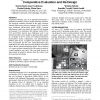10 search results - page 1 / 2 » Eye-tracking for user modeling in exploratory learning envir... |
KBS
2007
13 years 5 months ago
2007
In this paper, we describe research on using eye-tracking data for on-line assessment of user meta-cognitive behavior during interaction with an environment for exploration-based ...
ICALT
2010
IEEE
13 years 6 months ago
2010
IEEE
Multi-user virtual environments (MUVEs) seem to have great potential in education. Current educational uses of MUVEs seem to exploit them more as group interaction platforms and le...
AAAI
2012
11 years 7 months ago
2012
Goal recognition in digital games involves inferring players’ goals from observed sequences of low-level player actions. Goal recognition models support player-adaptive digital ...
UM
2007
Springer
13 years 11 months ago
2007
Springer
Accurately recognizing users’ affective states could contribute to more productive and enjoyable interactions, particularly for task-oriented learning environments. In addition t...
CHI
2007
ACM
14 years 5 months ago
2007
ACM
Augmented Chemistry (AC) is an application that utilizes a tangible user interface (TUI) for organic chemistry education. The empirical evaluation described in this paper compares...

